How to say water in French
The French word for water is “eau” (pronounced [o]). With the definite article (word for the), water in French is “l’eau” (pronounced [lo]). This post will explore everything you need to know about French and water including common vocabulary words, useful expressions, ordering water in restaurants and the most popular French water brands.
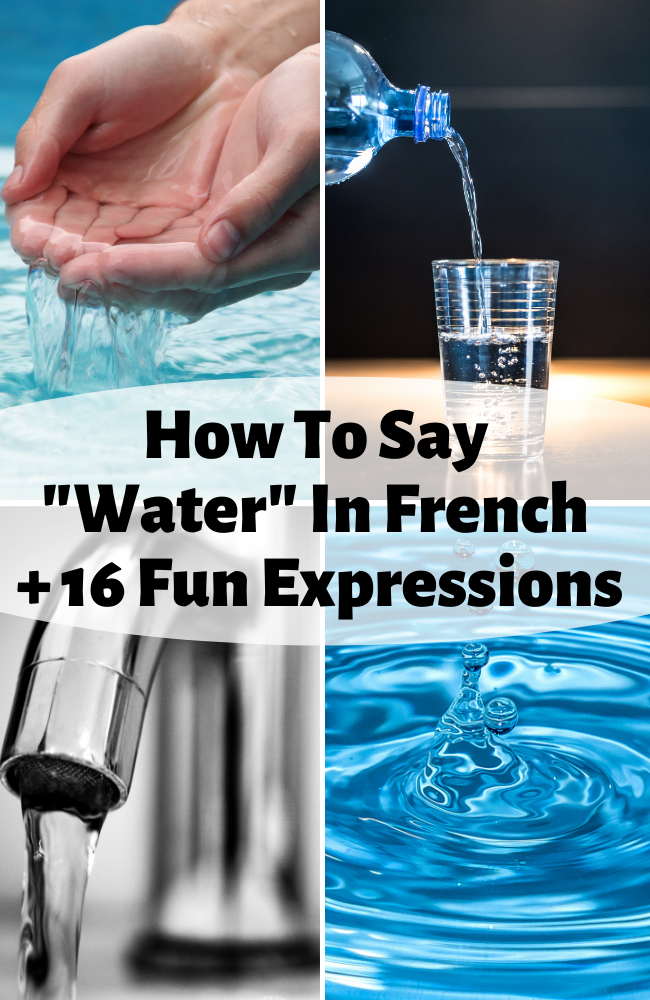
Towards the bottom of the page we’ve included 16 fun expressions which include the word l’eau (water).
And by the way, if this lesson doesn’t help you with your French learning, no big deal: “Comme de l’eau sur les plumes d’un canard!” (water off a duck’s back!). It will be “de l’eau a coulé sous les ponts” (water under the bridge).
How to pronounce water in French
As just mentioned, the word for water in French is “l’eau“. To read and pronounce the word properly, focus your eyes on the “au” and read these letters as “o” or “oh” as in “oh my gosh”. Then, precede that sounds with an -l. Hence, the pronunciation is [loh]. Ignore the -e as that will cause confusion.
In the following video, Julien Miquel, a native speaker on YouTube, explains the correct pronunciation of “l’eau“. In addition, the following page on forvo gives three audio samples of the pronunciation of “l’eau“.
L’eau is a feminine noun and must take feminine adjectives
The word for water, “l’eau” is a feminine noun. Thus, when modifying “l’eau” by and adjective, the adjective must be in the feminine form. This page covers rules for French adjectives in detail.
The French adjective for cold is “froid”. To say “cold water”, say “l’eau froide”. The -e on “froid” makes it agree with the feminine gender of “eau”. The added -e also makes it so we must pronounce the -d on “froid”.
It is not natural for us to add an -e to “froid” because we’re used to using “froid” in the context of weather expressions. For example, “il fait froid” means “it’s cold out”.
The French word for “hot” is “chaud”. Thus, the word for “hot water” is “l’eau chaude”. You must add an -e to “chaud” and pronounce the -d because “l’eau” is feminine.
Again, it is unnatural to add an extra -e on “chaud” and pronounce the final -d as we’re used to using “chaud” in the context of weather: “Il fait chaud” (it’s hot out).
Water and other common adjectives
Another adjective associated with water is “boiling”. The term for boiling water is “l’eau bouillante”. The term for water at room temperature is “l’eau tiède”.
Water in the plural form
To write the plural form of water in French, you must add an -x. Thus, “les eaux” translates literally to “the waters”. Thus, “Les Eaux De Chanel“, for example, refers to Chanel’s line of fragrances.
What does eau de toilette mean?
This brings us to an interesting and logical question: What does “eau de toilette” mean in French? “Eau de toilette” (pronounced [o d(ə) twalɛt]), refers to lightly scented cologne that can be applied after shaving. Other loose translations of “eau de toilette” are “aromatic waters” and “grooming waters”.
What is l’eau de vie?
In addition to “l’eau de toilette”, you may also hear the term “l’eau de vie“, which refers to clear distilled alcoholic beverages made from fruits other than grapes.
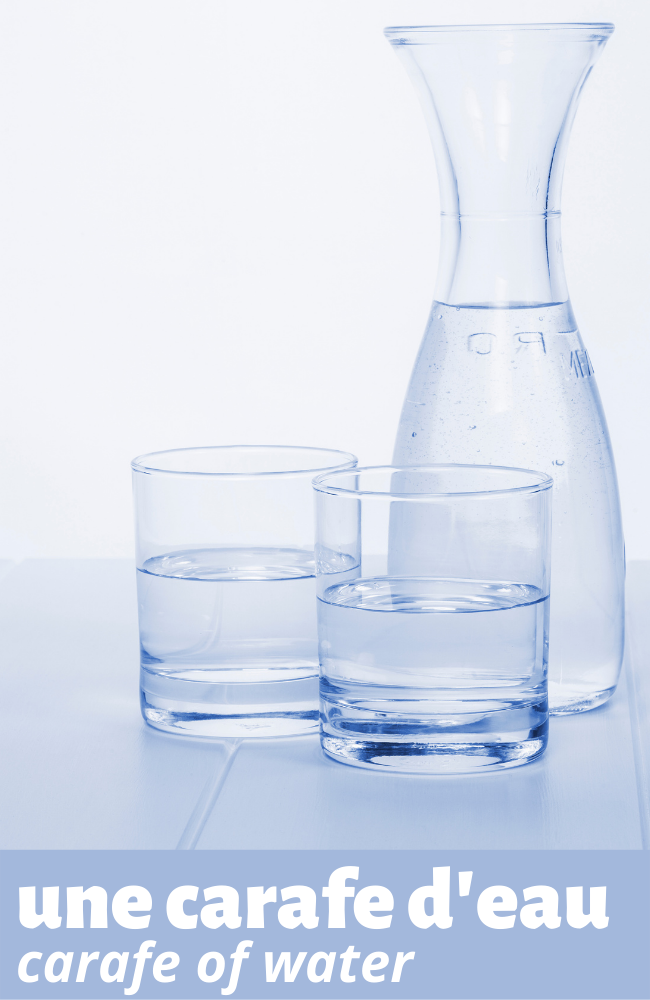
How to order water in French
This next section brings us to the question: “How can I ask for a glass or bottle of water in French”. Firstly let’s learn a few essential water words:
- un verre d’eau a glass of water
- une bouteille d’eau a bottle of water
- une carafe d’eau a carafe of water
It also must be pointed out that “de l’eau” means “some water” or “a portion of water”. This is the “partitive” article, which is used for expressing portions.
The next thing to learn is how to say both “Please give me” and “I would like”. Here goes:
- Donne-moi give me (familiar, to somebody you know)
- Donnez-moi (formal, to stranger or group)
- Je veux I want (informal and a bit demanding to the French ear)
- Je voudrais (I would like, polite and socially acceptable)
Hence, the following are some common ways to ask for water in a restaurant. This page offers a detailed explanation of how to order meals in French.
- Je voudrais de l’eau s’il vous plaît. I’d like some water please.
- Donnez-moi de l’eau s’il vous plaît. Give me some water please.
- Je voudrais une bouteill d’eau, s’il vous plaît. I’d like a bottle of water please.
- Donnez-moi un verre d’eau, s’il vous plaît. Give me a glass of water please.
- Je voudrais une carafe d’eau, s’il vous plaît. I’d like a carafe of water please.
The two words for “beverage” in French are “une boisson” and “un breuvage” (mainly used in Canada). This page gives a detailed list of French beverage vocabulary.
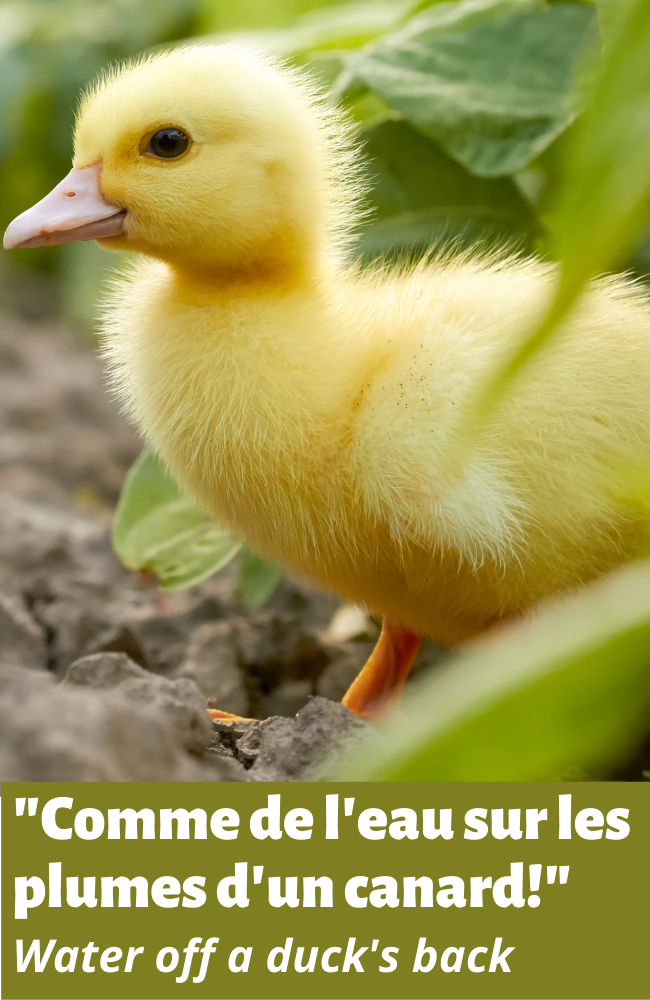
French water vocabulary
This section will cover various French water terms. The French are very particular about their water, and almost always have a bottle of water on the tables to accompany their meals.
There are two main words for sparkling or bubbling water: “l’eau gazeuse” (literally gassy water!) and “l’eau pétillante”. The adjective “pétillant“ means sparkling or fizzy.
There are a few more French water words which might come in handy in a restaurant or when shopping:
- l’eau plate still water (non-carbonated)
- l’eau minérale naturelle natural mineral water
- l’’eau du robinet tap water (You’ll look cheap if you ask for tap water in France!)
- l’eau de Seltz seltzer water
- l’eau de table table water
- l’eau de source spring water
What are some brands of French water?
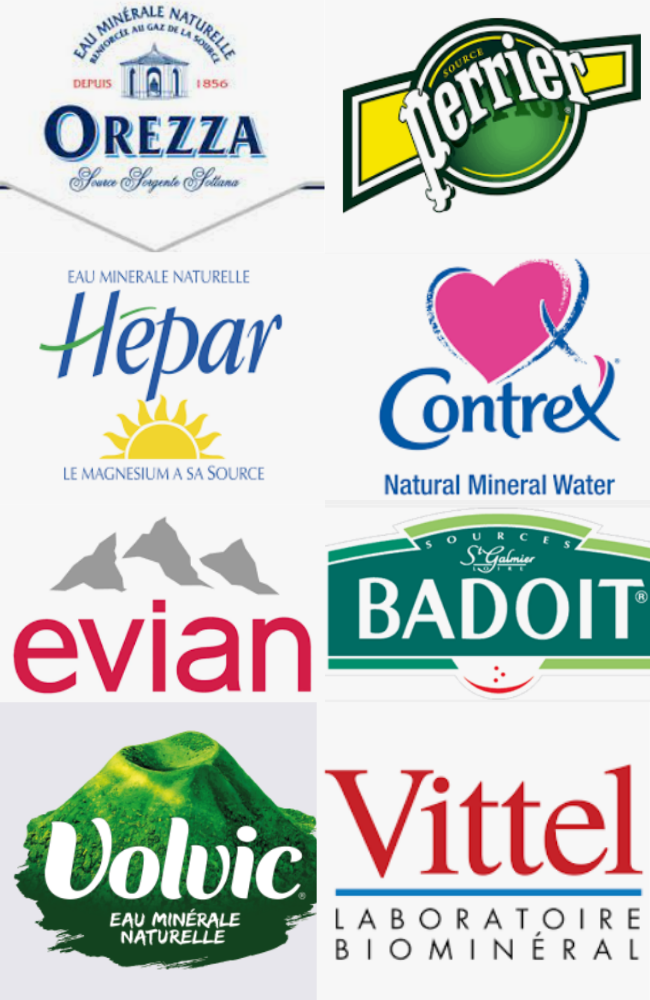
As previously mentioned, the French absolutely LOVE their brand name waters. In fact, if you drink water directly from the tap (l’eau du robinet), the French will label you a low-class, unsophisticated, ignorant American.
This page on finewaters.com offers a comprehensive list of French water brands and this page on easy-french-food.com gives a short explanation of each brand.
The following is a very short list of the most popular French brands of bottled water (l’eau en bouteille).
- Badoit (commonly consumed by families during mealtime at the table)
- Contrex
- Evian
- Hépar
- Orezza
- Perrier
- Vittel
- Quézac
- Volvic
Water in the home
The following is a list of terms that pertains to water in the home. We’ve also included some basic plumbing terms.
- avoir l’eau courante to have running water
- une chasse d’eau flush, toilet flush
- ballon d’eau chaude (also called un chaufe-eau) hot water tank
- compteur d’eau water meter
- l’eau de lavage, l’eau de lessive waste water, gray water
- l’eau potable drinkable water
- la plomberie, tuyauterie plumbing
- le lavabo bathroom sink
- l’évier kitchen sink
- la fosse septique septic tank
- une piscine swimming pool
Water and weather geography
The following list of water-related terms pertains to both weather and geography
To further your learning, this page offers a list of complete weather expressions and this page offers a list of geography vocabulary.
- l’océan (m) ocean
- la plage beach
- la mer sea
- la baie bay
- l’estuaire (m) estuary
- le fleuve river (major river)
- la rivière smaller river, tributary
- le lac lake
- l’étang pond
- le glacier glacier
- une chute d’eau waterfall
- le cours d’eau waterway, stream
- le canal canal
- l’eau de mer seawater
- l’eau pluviale rainwater
- le château d’eau water tower
- le captage d’eau water catchment basin
- la pluie rain
- la neige snow
- le nuage cloud
- la pollution de l’eau water pollution
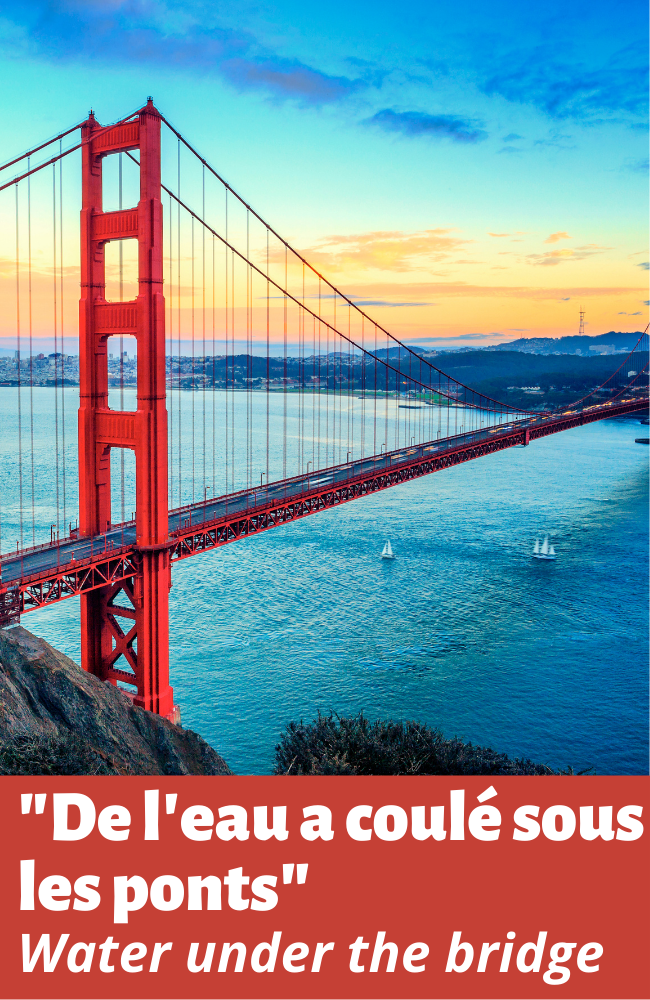
French water expressions
Finally, the French language has lots of fun expression containing the word “eau“.
- C’est la goutte d’eau qui fait déborder le vase it’s the final straw
- Se ressembler comme deux gouttes d’eau To be a spitting image
- Il y a de l’eau dans le gaz There’s trouble brewing
- C’est une goutte d’eau dans la mer It’s a drop in the ocean
- C’est une tempête dans un verre d’eau it is a tempest in a teapot
- Chat échaudé craint l’eau froide Once bitten, twice shy
- Clair comme de l’eau de roche Crystal clear
- Comme un poisson dans l’eau A duck in water, in one’s element
- Coup d’épée dans l’eau To flog a dead horse
- Chat échaudé craint l’eau froide Once bitten, twice shy
- Avoir l’eau à la bouche To make your mouth water
- À l’eau de rose Sentimental, sappy, mushy
- Aller/partir à vau-l’eau To go against the stream, current
- Apporter de l’eau au moulin de quelqu’un Add grist to the mill
- Au fil de l’eau With the flow, with the current
- Garder la tête hors de l’eau To keep your head above water
More French water vocabulary
Last but not least, here’s a quick list of random words which contain water that are worth knowing.
- une fontaine à eau / un distributeur d’eau water fountain
- un toboggan aquatique / une glissade d’eau (CA) water slide
- une bombe à eau water balloon
- résistant à l’eau water resistant
- un insecte d’eau water bug
- un pistolet à eau water (squirt) gun
